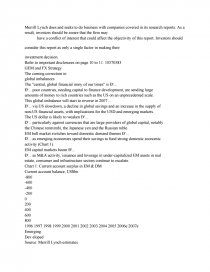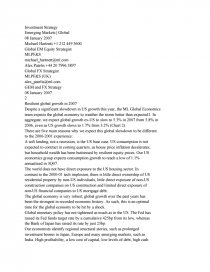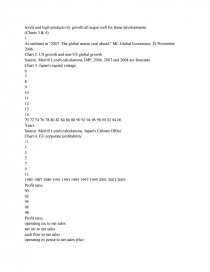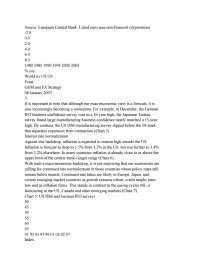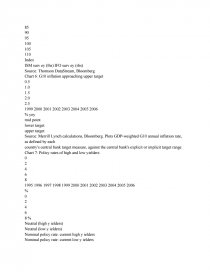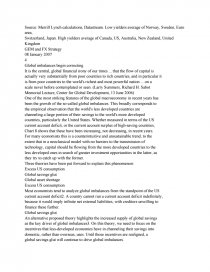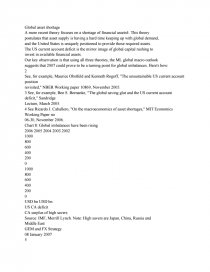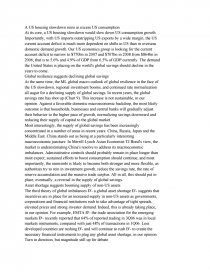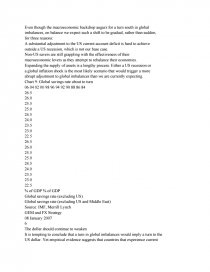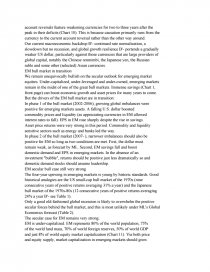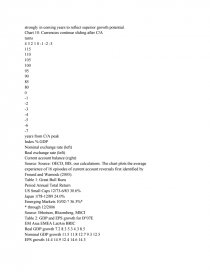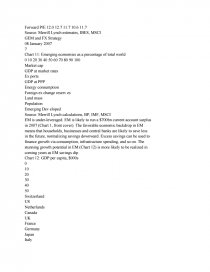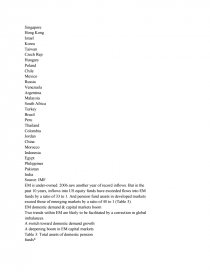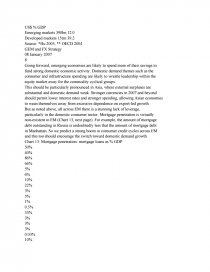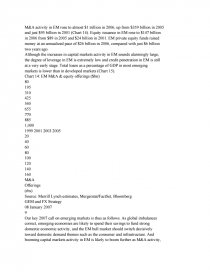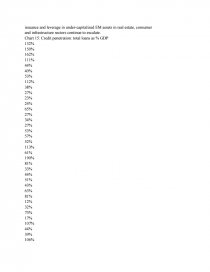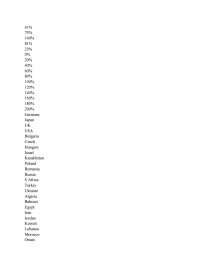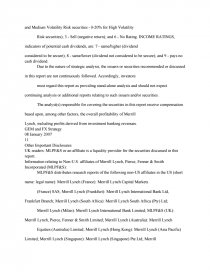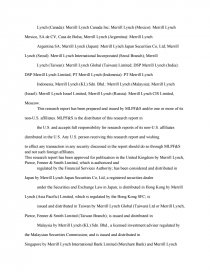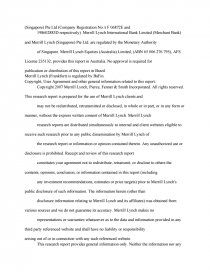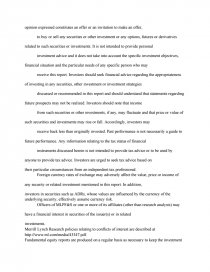Merrill Lynch Reprot
Essay by 24 • April 25, 2011 • 4,516 Words (19 Pages) • 1,395 Views
Essay Preview: Merrill Lynch Reprot
Merrill Lynch does and seeks to do business with companies covered in its research reports. As a result, investors should be aware that the firm may
have a conflict of interest that could affect the objectivity of this report. Investors should consider this report as only a single factor in making their
investment decision.
Refer to important disclosures on page 10 to 11. 10570583
GEM and FX Strategy
The coming correction in
global imbalances
The "central, global financial irony of our times" is Ð'...
Ð'... poor countries, needing capital to finance development, are sending large
amounts of money to rich countries such as the US on an unprecedented scale.
This global imbalance will start to reverse in 2007 ...
Ð'... via US slowdown, a decline in global savings and an increase in the supply of
non-US financial assets, with implications for the USD and emerging markets.
The US dollar is likely to weaken Ð'...
Ð'... particularly against currencies that are large providers of global capital, notably
the Chinese renmimbi, the Japanese yen and the Russian ruble.
EM bull market switches toward domestic demand themes Ð'...
Ð'... as emerging economies spend their savings to fund strong domestic economic
activity (Chart 1).
EM capital markets boom Ð'...
Ð'... as M&A activity, issuance and leverage in under-capitalized EM assets in real
estate, consumer and infrastructure sectors continue to escalate.
Chart 1: Current account surplus in EM & DM
Current account balance, US$bn
-800
-600
-400
-200
0
200
400
600
800
1996 1997 1998 1999 2000 2001 2002 2003 2004 2005 2006e 2007e
Emerging
Dev eloped
Source: Merrill Lynch estimates
Investment Strategy
Emerging Markets | Global
08 January 2007
Michael Hartnett +1 212 449 3600
Global EM Equity Strategist
MLPF&S
michael_hartnett@ml.com
Alex Patelis +44 20 7996 5897
Global FX Strategist
MLPF&S (UK)
alex_patelis@ml.com
GEM and FX Strategy
08 January 2007
2
Resilient global growth in 2007
Despite a significant slowdown in US growth this year, the ML Global Economics
team expects the global economy to weather the storm better than expected1. In
aggregate, we expect global growth ex-US to slow to 5.3% in 2007 from 5.8% in
2006, even as US growth slows to 1.7% from 3.2% (Chart 2).
There are five main reasons why we expect this global slowdown to be different
to the 2000-2001 experience:
A soft landing, not a recession, is the US base case. US consumption is not
expected to contract in coming quarters, as house price inflation decelerates,
but household wealth has been buttressed by resilient equity prices. Our US
economics group expects consumption growth to reach a low of 1.1%
annualized in 3Q07.
The world does not have direct exposure to the US housing sector. In
contrast to the 2000-01 tech implosion, there is little direct ownership of US
residential property by non-US individuals, little direct exposure of non-US
construction companies on US construction and limited direct exposure of
non-US financial companies to US mortgage debt.
The global economy is very robust; global growth over the past years has
been the strongest in recorded economic history. As such, this is an optimal
time for the global economy to be hit by a shock.
Global monetary policy has not tightened as much as in the US. The Fed has
raised its Fed funds target rate by a cumulative 425bp from its low, whereas
the Bank of Japan has raised its rate by just 25bp.
Our economists identify regional structural stories, such as prolonged
investment booms in Japan, Europe and many emerging markets, such as
India. High profitability, a low cost of capital, low levels of debt, high cash
levels and high productivity growth all augur well for these developments
(Charts 3 & 4).
1
As outlined in "2007: The global macro year ahead," ML Global Economics, 29 November 2006.
Chart 2: US growth and non-US global growth
Source:
...
...
